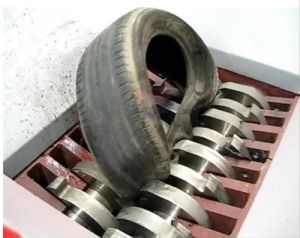
Double Shaft Tyre Shredder Machine
1,000,000 Per Piece
Shredding is a critical process in the disposal of wood waste, which is generated from various sources such as construction and demolition, furniture manufacturing, landscaping, and forestry activities. Wood shredding transforms bulky wood waste into smaller, manageable pieces, facilitating more efficient disposal, recycling, or repurposing.Key Roles of Wood Shredding in Disposal: Volume Reduction: Shredding reduces the size and volume of wood waste, making it easier to handle, transport, and store. This is particularly important for bulky wood materials like tree branches, pallets, and construction debris, which can take up significant space if not processed. Preparation for Recycling: Shredded wood can be repurposed and recycled into various products such as mulch, compost, particleboard, and wood pellets. Shredding is the first step in transforming waste wood into valuable materials that can be used in landscaping, agriculture, and energy production. Facilitation of Composting: Shredded wood chips are ideal for composting, as they break down more quickly and evenly compared to larger wood pieces. This accelerates the composting process, resulting in high-quality compost that can be used to enrich soil in gardens and agricultural fields. Reduction of Landfill Use: Shredding wood waste before disposal significantly reduces the amount of space required in landfills. By minimizing the volume of wood waste, shredding helps extend the lifespan of landfills and reduces the environmental impact of waste disposal. Support for Biomass Energy Production: Shredded wood can be used as a biomass fuel for energy production. The smaller, uniform wood chips produced by shredding are easier to burn in biomass boilers, enhancing combustion efficiency and contributing to renewable energy generation. Improvement in Waste Management Efficiency: Shredding wood waste improves the overall efficiency of waste management operations. It allows for better sorting, handling, and processing of wood materials, ensuring that they are disposed of in an environmentally responsible manner. Pest and Disease Control: Shredding wood waste, particularly from diseased or pest-infested trees, helps in reducing the spread of pests and diseases. The shredding process can destroy larvae and eggs, preventing the spread of invasive species and pathogens. Aesthetic and Safety Benefits: Shredding large, unwieldy pieces of wood waste into smaller, manageable chips improves safety and aesthetics, particularly in public areas, construction sites, and waste management facilities. This reduces the risk of accidents and improves the overall appearance of disposal sites. In summary, wood shredding plays a vital role in the efficient disposal and management of wood waste, contributing to volume reduction, recycling, composting, energy production, and environmental protection. It ensures that wood waste is handled in a sustainable and responsible manner, turning a potential disposal problem into valuable resources.

Foam Shredding Machine
Get Price Quote
Best Deals from Shredders

Medical Waste Shredder
300,000 Per Piece

Scrap Cable Shredder
Get Price Quote

Solid Waste Shredder
550,000 Per Piece

Shredding Machine
Get Price Quote
Output: 200-240 kg per hour. MOTOR: 40HP. Size of shreds: 15mm-25mm. Output: 30-40 kg per hour. MOTOR: 10HP. Size of shreds: 15mm-25mm.

Medical Waste Shredder
Get Price Quote
Medical Waste Shredder